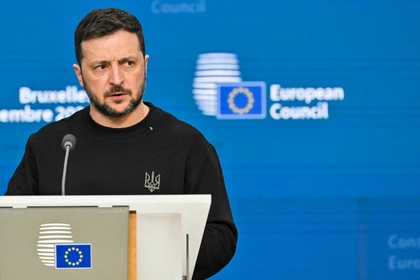President Volodymyr Zelensky on Monday dismissed Liubov Abravitova from the post of Ukraine’s ambassador to Botswana, a southern African nation bordering Zambia, Namibia, Zimbabwe and South Africa, and appointed Oleksiy Syvak instead.
Zelensky’s office announced Syvak’s appointment in a presidential decree and Abravitova’s dismissal, whose work in Botswana was listed as being on a part-time basis, in another decree. It did not state the reason behind the replacement.
JOIN US ON TELEGRAM
Follow our coverage of the war on the @Kyivpost_official.
Abravitova also serves as Ukraine’s ambassador to South Africa and Mozambique at present, according to the embassy’s website. Her postings in these two countries are presumably unaffected.
In April, Ukraine opened its first embassy in Gaborone, the capital of Botswana.
“I am convinced that the start of activities of the Ukrainian diplomatic mission in Gaborone will make it possible to establish smooth and effective interaction between our countries, to coordinate positions on important initiatives within the framework of the UN and other international organizations,” Ukraine’s Special Representative for the Middle East and Africa Maksym Subkh said at the time.
Botswana was one of the African nations that signed the Joint Communique of the Peace Summit during the Global Peace Summit held in Switzerland in June.
Alina Hrytsenko, a senior consultant at the National Institute for Strategic Studies, told Kyiv Post that establishing the embassy in Botswana is part of Kyiv’s “profound reassessment of the country’s foreign policy” following Russia’s 2022 invasion, where it aimed to expand its Western-centric focus.

Zelensky Says Trump and EU Must Work Together to Secure Peace
“As a European state, Ukraine prioritized Western Europe, the EU, and NATO as the primary directions of its foreign policy. This focus, while understandable, led to a lack of resources and attention dedicated to countries in the Global South, including those in Africa,” Hrytseno said.
“In recent years, Ukraine has sought to rectify this oversight by reinvigorating its engagement with these regions and consolidating partnerships and alliances, particularly on the African continent,” she added.
Hrytsenko said Botswana was chosen due to its developed economy and political stability among other factors, and consolidating political support from African nations would be “especially crucial” for the upcoming Second Peace Summit this fall.
“Over the past 2.5 years, Ukraine has established several embassies in Africa, underscoring the increasing significance of the continent in Ukraine’s foreign policy strategy. Among these partners, Botswana stands out as a key ally in the region due to its developed economy, political stability, adherence to democratic principles, and support for Ukraine in the United Nations,” said Hrytsenko.
However, she hinted it’d be an uphill battle for Ukraine to battle Russian propaganda in the region despite the efforts.
“The Ukrainian Ministry of Foreign Affairs has characterized the current engagement with Africa as a renaissance. However, it might be more accurate to describe it as the nascent development of bilateral relations with many African nations.
“Despite a lingering nostalgia and positive sentiments toward Russia in some African countries – stemming from the Soviet Union’s historical support for decolonization – there is now a strong presence of Russian propaganda in certain regions. Russia’s influence is particularly notable in politically unstable countries with high crime rates and low security, often those governed by military juntas such as Niger, Mali, and Burkina Faso,” she said.
In early August, Mali and Niger broke off diplomatic ties with Ukraine following reports that Kyiv was potentially involved in local rebels’ clashes in northern Mali against government troops augmented by Russian Wagner mercenaries.
Following the clashes in Mali, Andriy Yusov, a representative of Ukraine’s Main Intelligence Directorate (HUR), stated on television that “the rebels received necessary information, which enabled a successful military operation against Russian war criminals.”
HUR later provided an exclusive photo to Kyiv Post showing the rebels posing with a Ukrainian flag, though other outlets established that the photo was likely taken a month before the clashes.
The rebel group that claimed responsibility for the clashes with Wagner mercenaries later rejected claims that it received assistance from Ukraine or other foreign powers.
You can also highlight the text and press Ctrl + Enter






